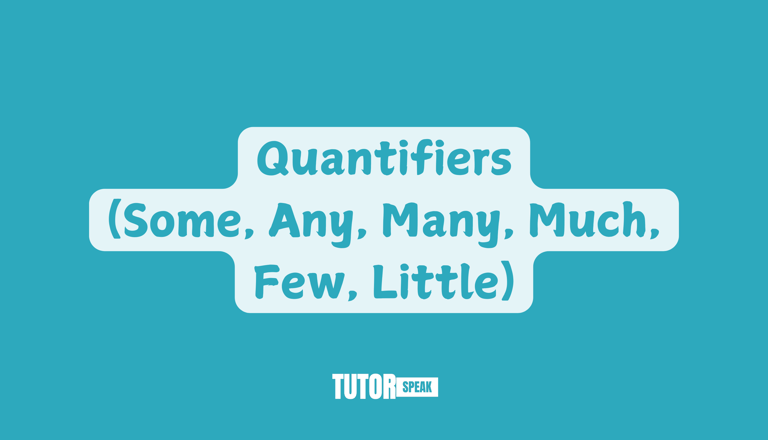Quantifiers (Some, Any, Many, Much, Few, Little) in English
Quantifiers are words that indicate the amount or quantity of something. In English, quantifiers are essential for expressing how much or how many of something exists. Some, any, many, much, few, and little are common quantifiers that can be used in different contexts.
TutorSpeak
2 min read


Quantifiers (Some, Any, Many, Much, Few, Little) in English
Quantifiers are words that indicate the amount or quantity of something. In English, quantifiers are essential for expressing how much or how many of something exists. Some, any, many, much, few, and little are common quantifiers that can be used in different contexts.
What Are Quantifiers?
Quantifiers help specify the quantity of a noun without stating an exact number. They can be used with both countable and uncountable nouns, but the choice of quantifier depends on the type of noun and the context of the sentence.
Common Quantifiers and Their Usage
1. Some
Usage: Used in positive statements, requests, and offers. Can be used with both countable and uncountable nouns.
Examples:
I have some friends.
Can I have some water?
She bought some apples.
2. Any
Usage: Used in negative sentences, questions, and conditional sentences. It is used for both countable and uncountable nouns.
Examples:
There aren’t any chairs available.
Do you have any questions?
If you need any help, let me know.
3. Many
Usage: Used with countable nouns in positive and negative sentences, and questions.
Examples:
There are many books on the shelf.
How many people are coming to the party?
I don’t have many options.
4. Much
Usage: Used with uncountable nouns in negative sentences, questions, and positive statements.
Examples:
How much sugar do you need?
There isn’t much water left in the bottle.
She doesn’t have much time to finish the task.
5. Few
Usage: Used with countable nouns to refer to a small quantity. It generally has a negative connotation.
Examples:
There are few students in the class today.
I have few friends in this city.
6. Little
Usage: Used with uncountable nouns to refer to a small amount. It also has a negative connotation.
Examples:
There is little milk in the fridge.
I have little information about the event.
Common Mistakes:
❌ Mistake 1: Using "Much" with Countable Nouns
Incorrect: There are much books on the table.
Correct: There are many books on the table.
Explanation: "Much" is used with uncountable nouns. For countable nouns, use "many" instead.
❌ Mistake 2: Using "Many" with Uncountable Nouns
Incorrect: How many sugar do we need?
Correct: How much sugar do we need?
Explanation: "Many" is for countable nouns, whereas "much" is for uncountable nouns.
❌ Mistake 3: Using "Few" with Uncountable Nouns
Incorrect: There is few water in the glass.
Correct: There is little water in the glass.
Explanation: "Few" is for countable nouns, and "little" is used with uncountable nouns.
❌ Mistake 4: Using "Some" in Negative Sentences
Incorrect: We don’t have some apples.
Correct: We don’t have any apples.
Explanation: In negative sentences, we use "any" instead of "some".
4 Exercises on Quantifiers
✔ Exercise 1: Fill In The Blanks With The Correct Quantifier
There are ______ people in the room.
I have ______ time to meet you today.
Do you have ______ questions?
There is ______ coffee left in the pot.
✔ Exercise 2: Choose The Correct Quantifier
How ______ chairs are in the kitchen?
a) many
b) muchWe have ______ milk left in the fridge.
a) much
b) manyThere are ______ students in the library today.
a) few
b) littleThere isn’t ______ water in the bottle.
a) much
b) many
✔ Exercise 3: Correct The Mistakes In These Sentences
He doesn’t have much pencils. → Correct it: __________
I have little books to read. → Correct it: __________
There are many advice in this book. → Correct it: __________
How few sugar do you need? → Correct it: __________
✔ Exercise 4: Write Sentences Using The Correct Quantifiers
Write a sentence using "many" with a countable noun.
Write a sentence using "much" with an uncountable noun.
Use "few" in a sentence with a negative connotation.
Write a sentence using "some" in a question.



